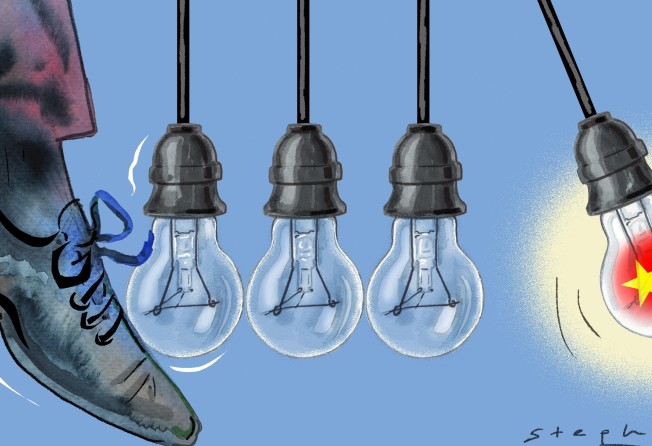How US trade war and other efforts to thwart China’s rise have actually accelerated its reform and innovation
- Edward Tse says the trade war has made a stronger case for China’s reform and innovation. However, foreign multinationals should also realise they can’t be complacent any more: they should learn to innovate in, and for, the Chinese market

In trying to curb China’s supposedly unfair trade practices and substantially reduce its trade deficit with China, the United States is unintentionally helping to accelerate China’s reform and innovation.
Washington’s trade war has gained support from many in the Sinophobic circle of politicians, businesses and lobbyists, who have long complained about Beijing’s treatment of foreign businesses, especially those from the US, on issues such as intellectual property protection, forced technology transfer and market access.
However, while it is arguable that China’s market liberalisation could be faster, it is unfair to say Beijing has blocked most foreign companies. In the tech sector, pundits lament that Facebook and Twitter are blocked in China, but neglect to mention Apple, Amazon, Bing, LinkedIn, eBay and Airbnb are not.
While Chinese tech giant Huawei has met with the American and other governments’ roadblocks overseas, its American counterpart Cisco continues to do business in China. As The Economist’s Schumpeter column notes in the June 28 edition, the picture of American firms being victimised in China is exaggerated.
Since US President Donald Trump’ tariff war broke out, China has accelerated the opening of its market to foreign companies. Last April, Beijing set a timetable for phasing out foreign ownership limits in the automotive industry. It is also easing curbs on sectors such as banking, securities, insurance, agriculture and aircraft manufacturing. Recently, BT Group became the first non-Chinese telecom company in China to get a nationwide operating licence. S&P Global’s Beijing-based wholly-owned subsidiary was also given a green light to enter the Chinese bond rating market.
Reform is also coming to the private economy. To boost the private sector, Chinese President Xi Jinping met entrepreneurs last November, and China Banking and Insurance Regulatory Commission chief Guo Shuqing followed up with a statement that no less than 50 per cent of new loans should go to private businesses.
At the same time, China is stepping up mixed ownership reform, that is, diversifying the ownership of parts of the state sector. According to the National Development and Reform Commission, 100 more state-owned enterprises will join the mixed-ownership reform programme. Along the way, many “zombie” enterprises will be eliminated.
To improve the protection of intellectual property right, China’s top court has started to rule on intellectual property cases since the beginning of this year; laws are also being drafted to ban forced technological transfer.
In Davos, Chinese Vice-President Wang Qishan stressed that China would continue to carry out structural reforms and adhere to multilateralism.
Last November, The New York Times wrote in a special report: “The Chinese economy has grown so fast for so long now that it is easy to forget how unlikely its metamorphosis into a global powerhouse was.” In fact, China owes the remarkable resilience of its economy to its own evolving development model of “three-layer duality”.
At the top, the central government sets goals and directions, giving the rest of the country clear targets to follow. At the grass-roots level, private entrepreneurs have re-emerged and become a major force in driving the growth of China’s economy. And in the middle, China’s local governments channel their resources into national and local priorities, often competing but also collaborating within regional clusters. To this end, they work closely with entrepreneurs who bring innovative ideas to bear.
Undoubtedly, the current trade dispute has generated much uncertainty and volatility for China, as well as the rest of the world. It has exposed a fundamental mistrust of China in certain parts of the West, and given some Western businesses an opportunity to amplify their long-standing concerns about China, justifiable or not, through their respective chambers of commerce. This should have woken up the Chinese government to the fact that it needs to adjust its approach. This is why Beijing is reinforcing its commitment to globalisation and accelerating reform.
The short-term issues brought on by the trade dispute would naturally unsettle some foreign multinational companies operating in China, but for many others, especially the larger ones, China has become so strategically important that they must figure out a way to overcome the challenges.
China’s innovation – the fast-evolving consumer demand patterns, rapidly developing government policies and regulations, increasingly prevalent tech-enabled business innovations, and the emergence of bona fide innovative and competitive local companies – has led many foreign multinationals to the realisation that what they have learned in the West won’t give them an advantage in the local market any more. Their success in China is no longer guaranteed if they rely only on what they already know. They will need to learn how to innovate in China, for China, and also in China for the world – and this won’t be easy for many.
China has reached a turning point. The age of single-minded pursuit of growth is over, and there will instead be a focus on refining the country’s economic structure, quality and sustainability. However, many in the West and even some within China are doubtful about whether Beijing will be able to make the necessary changes in a timely manner.
The challenge remains for the Chinese government to demonstrate its commitment and ability to fully implement the changes. Paradoxically, the pressure from outside, intended to thwart progress, is likely to push China into more reform and opening. Expect new waves of developments and new opportunities for companies from all over. The companies who can seize these opportunities will be among the true winners in the trade dispute.
Edward Tse is founder and CEO of Gao Feng Advisory Company, a global strategy and management consulting firm with roots in greater China. He is also author of China’s Disruptors